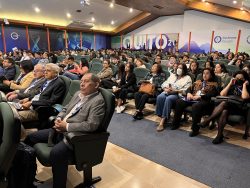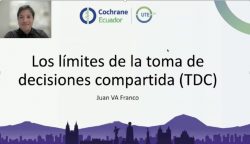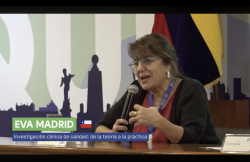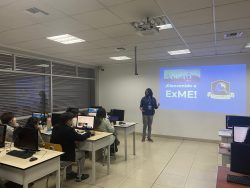XIX Meeting of the Ibero-American Cochrane Network was held in Quito with the active participation of CIESAL researchers
22/07/2023
During the first half of June, the XIX annual meeting of the Ibero-American Cochrane Network was held at the UTE University in Quito, Ecuador. The event brought together health professionals and researchers engaged in the synthesis of scientific evidence in clinical practice for informed decision-making in public health policies. This meeting is held in a different country every year and brings together experts and health professionals from the Ibero-American region and other countries in the world associated with the Cochrane Network.
Cochrane is an independent international network, based in the UK, and is a non-profit organisation, with members and supporters from over 190 countries. It does not accept official funding and seeks to deliver quality and reliable information, unhindered by commercial or economic interests. It is aimed at all those interested in using high quality information to make health decisions and seeks to be a powerful tool to help improve their medical knowledge and decision making by compiling and summarising the best evidence from medical research.
Over the three days of the meeting, presentations and panel discussions were held on the latest trends in evidence-based healthcare. Among the topics addressed by the experts were the construction and implementation of clinical practice guidelines, education and knowledge transfer, and informed decision making. Training workshops were also given on techniques relevant to the development of systematic reviews and meta-analyses, such as searching for scientific evidence, the application of GRADE, medical writing, and statistical analysis and modelling, among others.
CIESAL was represented by Eva Madrid, co-director of Cochrane Chile, and researchers Nicolás Meza, Javier Bracchiglione, Sergio Muñoz, Juan Víctor Ariel Franco and Gerard Urrútia Cuchí, the latter being the director of the Ibero-American Cochrane Network, all of whom gave presentations or workshops.
Welcome speeches reaffirm the public mission of the Cochrane Network

On 9 June, the opening day of the Meeting, Daniel Simancas, Dean of the Faculty of Health Sciences of the UTE, the host university, addressed the students in attendance to explain the rationale for the existence of the Cochrane Network. He pointed out that “in a world swamped by information, evidence-based health practice provides us with the necessary tools to filter and critically evaluate information, allowing us to make calibrated, verified decisions based on the most solid scientific evidence”. This practice, according to the dean, benefits patients, improves population health indicators and reduces healthcare costs. “In our commitment to provide quality care, we cannot forget humanism, empathy and respect for the values and preferences of our patients, which are fundamental to our practice,” the dean said.
For his part, Gerard Urrútia, director of the Ibero-American Cochrane Network, discussed the great challenges facing Cochrane – as an organisation with limited resources compared to other global conglomerates connected to medicine and the pharmaceutical industry – by invoking the biblical example of David versus Goliath.
“We need to tackle the ignorance that fuels myths and false beliefs which, while sometimes well-intentioned, causes harm and negative consequences to communities. At other times we face the Goliath of manipulation where some take advantage of people’s vulnerability for personal gain. At other times we face the Goliath of private interests that prevail over those of the collective. To face these giants, in Cochrane we are few, we do not have great resources, but like David, we have a strong sense of identity and mission, and this is nothing else than to promote the welfare of people, the quality of healthcare – not only technical quality, but also human quality -, equity in the provision of services, and the sustainability of health systems,” reflected the director of the Cochrane Network.
CIESAL researchers gave presentations at a round table on Informed Decision-Making

In his presentation, the editor-in-chief of the British Medical Journal Evidence Based Medicine, Argentinean physician and CIESAL associate researcher Juan Víctor Ariel Franco, discussed the limits of shared decision making as an optimal approach to patient encounters in clinical care. According to Franco, shared decision making combines evidence-based medicine with communication skills for optimal patient care. Such shared decision making involves several steps: seeking the patient’s input, helping him or her compare treatment options, assessing his or her values and preferences, making a decision with him or her, and, finally, evaluating that decision. This joint decision must be informed and requires a clear understanding of what the patient’s preferences are, what value he or she places on the existing options and how they fit into his or her daily life and future outlook. Successful outcomes require strong communication skills on the part of health professionals and remembering that each patient is unique and that no decision can be made that disregards the patient’s vision and interests.
Of course, there are circumstances in which public interests outweigh individual interests (classic example: vaccine versus non-vaccine), where the deliberative possibility with the patient in the clinic is limited. A similar situation arises with the pressure on physicians to reduce the inappropriate use of antibiotics to avoid microbial resistance. Another scenario that affects decision-making is that of weak or absent evidence, which is the case with certain alternative medicines for which there is little information. In this scenario, one has to think about what is in the patient’s best interest, since the principle of autonomy cannot override the principle of non-maleficence in the Hippocratic Oath. Something similar happens with some traditional medicines that might be effective, but where, for various reasons, quality evidence to support them is often lacking.

The presentation given by Eva Madrid, director of CIESAL and co-director of Cochrane Chile, was entitled “Quality clinical research, from theory to practice”. The specialist pointed out that according to the WHO, quality clinical research must be based on the best scientific knowledge to produce the best evidence for decision-making, so that care is more effective, less harmful and less costly.
For evidence to be of high quality, it must be focused on priorities. Clinical research and evidence in health must flow so that there is a production of primary evidence that is synthesised and that then produces a transfer of knowledge to support decision-making while also generating new primary evidence. The problem is that the use of this evidence is limited because, according to Dr. Madrid, we have been operating within rigid frameworks where we give the clinical trial supremacy in research and the production of papers has become a kind of bondage in the academic world, which does not always lead to better evidence.
Criticism has emerged from within the scientific field that some evidence has been hijacked by corporate interests. Likewise, it is difficult for evidence to emerge from the medical world that leads to fewer procedures, tests or interventions, i.e. that translates into less medicine. Moreover, we are facing an explosive growth of celebrities turned health opinion leaders, pseudo-scientists or denialists, who are proliferating in traditional media and social networks. On the other hand, there are researchers in the pure sciences who have developed research policies that tend to serve their own personal curiosities rather than the sick. This is undoubtedly harming the generation of high quality synthesised evidence.
Workshops for health professionals from different South American countries
Two other CIESAL researchers conducted training workshops for health professionals, students and interested members of the public who attended the Cochrane Network meeting in person or online.
The doctor and CIESAL researcher Nicolás Meza led a mixed workshop on scientific writing and editing in research, which was the best attended workshop of the meeting, with 275 online participants and 25 in person. The workshop was attended by health professionals from various disciplines interested in publishing, developing theses or other activities where scientific writing plays a fundamental role.

Dr. Meza introduced his workshop by explaining why natural language processing models (such as OpenAI’s ChatGPT) cannot supplant or replace authors in generating a sound scientific report. Next, he explained concepts such as reporting guidelines for publishing in medicine, the structure of a manuscript, syntax and style concepts, the use of the active voice over the passive voice, the efficient use of verbs, and parallelism as a harmonisation technique in manuscript writing, among others. He also took part in the Students for the Best Evidence (ExME) workshop as a facilitator, together with Ana Beatriz Pizarro from Colombia and Rocío Fuentes from Chile.
Javier Bracchiglione, UV physician, CIESAL researcher and PhD candidate, led a practical methodological workshop. This was a workshop dealing with overviews of systematic reviews, which consist in synthesising information from several systematic reviews that answer the same question.
Dr. Bracchiglione presented the innovative GROOVE (Graphical Representation of Overlap for OVErviews) tool. In front of an audience of professionals and academics interested in scientific research, he provided a comprehensive survey of systematic review overviews, highlighting the key steps involved in their development. He introduced GROOVE as a platform that uses a modification of the corrected covered area (CCA) formula to assess the level of overlap between primary studies included in systematic reviews. This workshop was welcomed by the scientific community, because when synthesising several systematic reviews, it is common to have primary studies included in more than one review, which tended to overestimate the results by including patients more than once. GROOVE addresses the issue of overlapping primary articles and is considered a valuable tool to promote more accessible and high quality evidence-based research. The tool for assessing overlapping primary studies was developed by Dr. Bracchiglione as part of his doctoral thesis in Biomedical Research Methodology and Public Health at the Autonomous University of Barcelona.
UTE Quito Article
https://www.ute.edu.ec/ute-participo-en-la-reunion-de-la-red-cochrane-iberoamerica/



